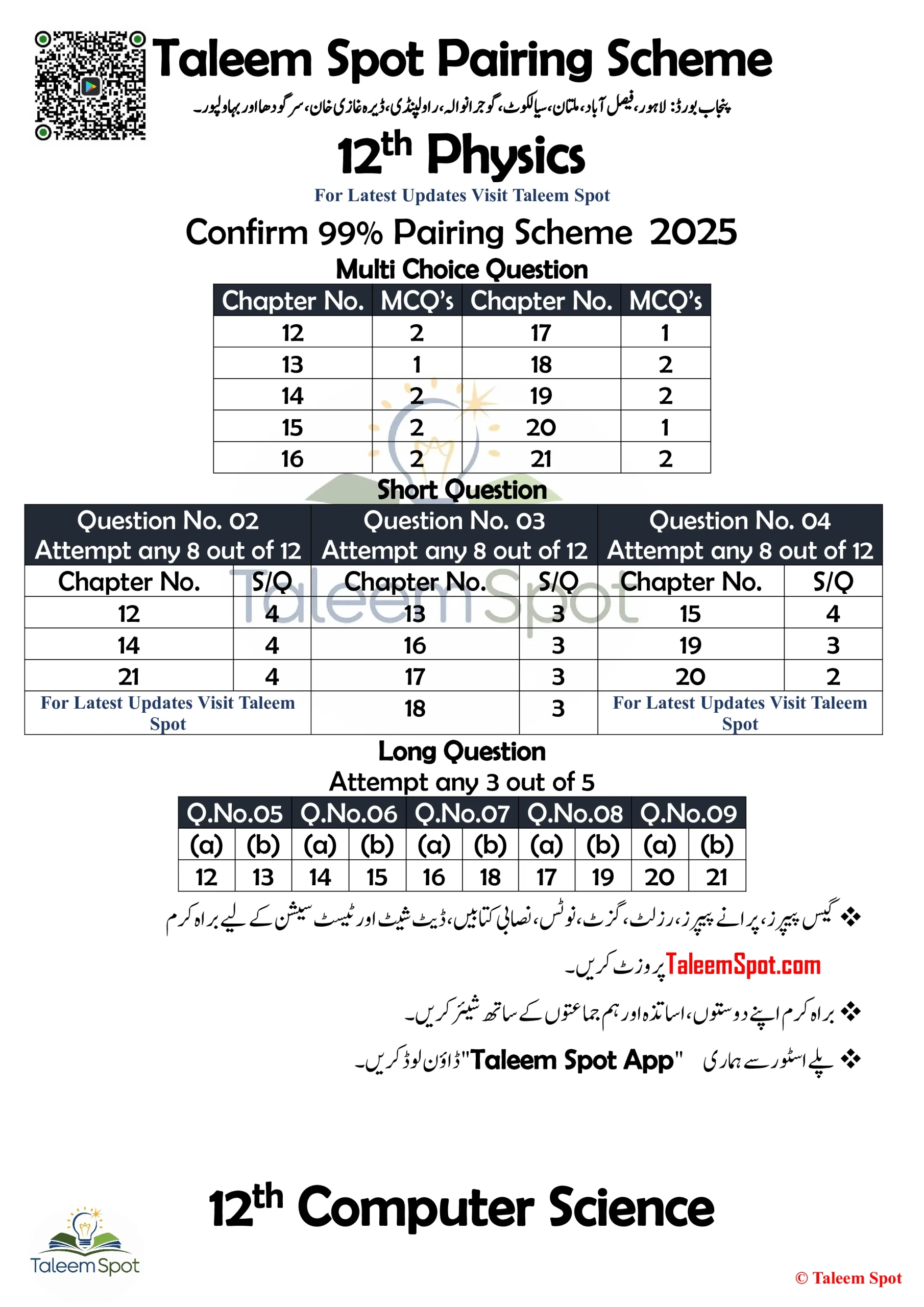12th Class 2nd Year Physics Pairing Scheme Punjab Board 2025

The 12th Class 2nd Year Physics Pairing Scheme Punjab Board 2025 is an invaluable tool for students preparing for their final board exams. Physics, as a subject, requires a balance of theoretical understanding and problem-solving skills, making a pairing scheme essential for targeted preparation. Whether you’re appearing under the Lahore, Rawalpindi, Multan, Gujranwala, Faisalabad, Bahawalpur, Sahiwal, Sargodha, or Dera Ghazi Khan Board, understanding the pairing scheme can help you streamline your study efforts and maximize your performance.

All Subjects Pairing Scheme : Visit Here
Importance of the Physics Pairing Scheme
Physics is often regarded as a challenging subject because of its conceptual nature and numerical problems. The 12th Class 2nd Year Physics Pairing Scheme Punjab Board 2025 helps simplify preparation by:
- Highlighting Important Chapters: It specifies which chapters are more significant for long and short questions.
- Improving Exam Strategy: Knowing the pattern helps in planning time during exams.
- Guiding Numerical Practice: Physics exams include numerous numerical problems. The pairing scheme outlines which chapters these are likely to be drawn from.
- Boosting Confidence: Familiarity with the exam format reduces anxiety and increases confidence.
Overview of the Physics Pairing Scheme Structure
The pairing scheme for Physics in the 12th Class typically divides the syllabus into the following sections:
1. Multiple Choice Questions (MCQs)
MCQs are a crucial part of the exam and often test your basic conceptual understanding. The pairing scheme provides information on the chapters that contribute most to this section.
2. Short Questions
Short questions require concise yet accurate answers. These are distributed across chapters, and the pairing scheme helps prioritize chapters with higher weightage.
3. Long Questions
The long question section is the most critical, requiring detailed understanding and numerical accuracy. The pairing scheme shows the pairing of chapters that combine to form these questions.
Board-Specific Guidance
Here’s how the 12th Class 2nd Year Physics Pairing Scheme Punjab Board 2025 benefits students from different boards:
1. Lahore Board
Lahore Board’s pairing scheme emphasizes chapters like Electromagnetic Induction and Alternating Current for long questions. Numerical problems from these chapters are frequent.
2. Rawalpindi Board
The Rawalpindi Board focuses on chapters such as Current Electricity and Electromagnetism for both theoretical and numerical questions.
3. Multan Board
Multan Board students will find the pairing scheme particularly helpful in mastering conceptual topics like Wave Optics and Numerical Solutions.
4. Gujranwala Board
The Gujranwala Board highlights the importance of chapters such as Nuclear Physics and Simple Harmonic Motion, ensuring clarity in both theory and applications.
5. Faisalabad Board
The Faisalabad Board pairing scheme allows students to focus on chapters like Electromagnetic Waves and Digital Electronics, which are high-scoring.
6. Bahawalpur Board
Bahawalpur Board places emphasis on Alternating Current Circuits and Electromagnetic Waves. Students should focus on mastering the related formulas and concepts.
7. Sahiwal Board
Sahiwal Board’s pairing scheme includes significant coverage of Sound Waves and Quantum Physics, which are often part of the long questions.
8. Sargodha Board
The Sargodha Board encourages preparation for Thermodynamics and Electrostatics, two chapters that frequently appear in the long and short question sections.
9. Dera Ghazi Khan Board
The DG Khan Board pairing scheme highlights Optics and Wave Properties, ensuring students practice related numericals extensively.
How to Use the Physics Pairing Scheme Effectively
1. Prioritize High-Weightage Chapters
Start your preparation by focusing on chapters with a higher probability of appearing in the exam. These are usually identified in the pairing scheme.
2. Practice Numerical Problems
Physics exams often have a significant numerical component. Use the pairing scheme to practice numerical problems from high-priority chapters.
3. Understand the Concepts
Physics requires a deep understanding of concepts. Memorization alone won’t suffice, so focus on understanding the principles behind formulas and laws.
4. Combine Past Papers with the Pairing Scheme
Using past papers alongside the pairing scheme gives you a clear idea of how questions are structured and repeated.
5. Revise Regularly
Consistent revision is key to retaining concepts, especially in Physics, where many chapters are interrelated.
Benefits of Following the Pairing Scheme
- Efficient Preparation: Saves time by narrowing down the focus to essential topics.
- Reduced Stress: Knowing what to expect in the exam reduces anxiety and boosts confidence.
- Improved Time Management: Helps allocate preparation time effectively across different sections of the syllabus.
- Higher Scores: A strategic approach often results in better marks.
Common Mistakes to Avoid
1. Ignoring Low-Weightage Chapters
While the pairing scheme focuses on significant chapters, neglecting others can lead to surprises in the exam.
2. Overlooking Numerical Practice
Numerical problems are scoring but require regular practice. Do not skip this essential aspect of preparation.
3. Skipping Diagrams
Physics often requires labeled diagrams, especially in long questions. Ensure you practice these thoroughly.
4. Relying Solely on the Pairing Scheme
While the pairing scheme is an excellent tool, it cannot replace comprehensive study of the syllabus.
Findings
The 12th Class 2nd Year Physics Pairing Scheme Punjab Board 2025 is a well-thought-out guide for students aiming to excel in their Physics exams. By focusing on key chapters, prioritizing numericals, and practicing past papers, students from all Punjab Boards—Lahore, Rawalpindi, Multan, Gujranwala, Faisalabad, Bahawalpur, Sahiwal, Sargodha, and DG Khan—can maximize their potential and achieve excellent results.
FAQs
1. What is the purpose of the 12th Class 2nd Year Physics Pairing Scheme?
The pairing scheme helps students focus on key chapters and understand the distribution of questions for better preparation.
2. How often is the pairing scheme updated?
The pairing scheme is updated annually to align with the latest syllabus and exam trends.
3. Does the pairing scheme include practical exams?
No, it primarily focuses on the theoretical part of the exam.
4. How can I obtain the pairing scheme?
The pairing scheme is available on official board websites and educational platforms like Taleem Spot.
5. Are numerical problems included in the pairing scheme?
Yes, the pairing scheme highlights chapters that frequently include numerical problems.
6. Is the pairing scheme consistent across all Punjab Boards?
Yes, it is generally consistent with minor variations depending on the board.
7. How can I improve my Physics preparation?
Use the pairing scheme, practice past papers, focus on numericals, and revise regularly.
8. Are diagrams necessary in Physics exams?
Yes, diagrams are an important part of Physics exams, especially in long questions.
9. Can I rely solely on the pairing scheme for preparation?
No, it’s a supplemental tool and should be used alongside the complete syllabus.
10. What chapters are most important for Physics exams?
Chapters like Electromagnetism, Current Electricity, and Wave Optics are often emphasized in the pairing scheme.




